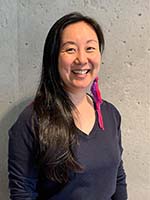CNF Contest Now Open!

Submit your personal essays, memoirs, narrative nonfiction pieces, social commentaries, travel writing essays, historical accounts, and/or biographies and you could win $1,000!
The judge for 2019 is Yasuko Thanh. Look for an interview with her in our upcoming July Malahat lite e-newsletter!
Entry fee comes with a complimentary one-year print subscription:
$35 CAD for Canadian entries
$40 USD for entries from the USA
$45 USD for entries from elsewhere
Full contest information on the Malahat Review website.
Spring Issue Interview with Nozomi Imanishi on CNF
 Malahat Review volunteer Sarah Brennan-Newell talks with Nozomi Imanishi about the funeral process, grief, and what inspired her to write her essay, "Remains."
Malahat Review volunteer Sarah Brennan-Newell talks with Nozomi Imanishi about the funeral process, grief, and what inspired her to write her essay, "Remains."
SBN: I was very interested to read about the rituals of the Japanese funeral process, and the multiple events which coincide with the gradual disassembling of the physical body. Did you know at the time that this experience was one you would want to write about, or was writing a way of processing that came to you afterwards?
NI: I knew I wanted to write about the funeral halfway through the wake. There were so many other details and events that happened that I didn’t include that felt so surreal to me, but were so normal in that particular context and for the people involved. I think I almost had to write about it for an audience that would find it as surreal as I had. It helped me to process what had happened in a way that was safe, still respectful, and hopefully not too heavy but acknowledged how unordinary I’d found it.
Read the rest of Nozomi's interview on the Malahat website.
Interviews with the 2019 Long Poem Prize Winners
Erin Soros
 Malahat Review Marketing & Promotions Assistant Safiya Hopfe talks with Erin Soros, winner of the 2019 Long Poem Prize for "Weight," which will appear in the 2019 Summer Issue #207.
Malahat Review Marketing & Promotions Assistant Safiya Hopfe talks with Erin Soros, winner of the 2019 Long Poem Prize for "Weight," which will appear in the 2019 Summer Issue #207.
SH: Did you know from the start that “Weight” would explore so much more than the experience of lifting? How did that metaphor expand as you thought about, outlined, and wrote the piece?
ES: I was circling the weight of grief, the weight of trauma, the weight of language, the weight of madness—and the opposite, how these things can seem unbearably light, to invoke Milan Kundera’s coinage. In a state of psychosis, language can ricochet, words shimmering and seemingly limitless in their associations. And what does a word mean then? At one point in the poem I tried to capture that chaotic texture, word after word, sense unspooling. But when we encounter trauma, language can also fall, as if dropped, a hard heavy thing. To confront these weightless or weighty states head-on in the writing felt overwhelming and amorphous, so the return to weightlifting—both literally in my everyday practice and figuratively as a trope in the poem—was a way to create structure and relief. I like when something physical and sensuous can function as a stabilizing force in a work—Maggie Nelson writing about heartbreak through the colour blue, or Kyo Maclear writing about grief through her observations of birds. The blue and the birds are more than metaphor—they are vividly themselves, drawing the writers and the readers back to the world.
Read the rest of Erin's interview on our website.
John Elizabeth Stintzi
 Malahat Review volunteer Chloe Hogan-Weihmann talks with John Elizabeth Stintzi, winner of the 2019 Long Poem Prize for "Cold Dying Black Wet Cold Early Thing," which will appear in the 2019 Summer Issue #207.
Malahat Review volunteer Chloe Hogan-Weihmann talks with John Elizabeth Stintzi, winner of the 2019 Long Poem Prize for "Cold Dying Black Wet Cold Early Thing," which will appear in the 2019 Summer Issue #207.
CHW: The season of spring is often seen as a time of warmth and renewal, but in your poem, it represents death and cold. Can you talk a little bit about that?
JES: Many seasons are seen from very different lights from the lights they reveal to farmers (and likely anyone whose life is tied up with the land). For nearly as long as I can remember, we have calved in the spring (transitioning from calving a few months earlier, in winter) and so spring has been long coloured-in as a season of brutality.
There is a lot of renewal, of course—and it has many advantages to winter—but there is also just as much mud and flooding and death. I think those are fairly universal, but I think one needs to be outside the city and close to the land to witness that, and so instead many of us sit in urban spaces and think of warmth and cherry blossoms and birdsong and days lengthening—all beautiful, renewing things.
Read the rest of John's interview on our website.